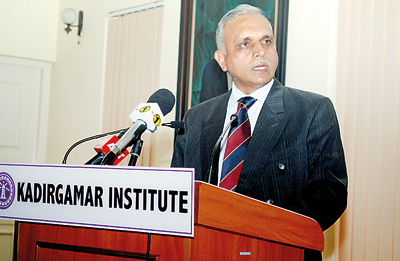News
Solution to Tamil question vital for region’s stability: Indian expert
Greater devolution of powers to the provinces and amicable resolution of the Tamil grievances is pivotal to long-term stability in the region. These were the words of seasoned diplomat Dr Arvind Gupta, on Wednesday, when he was asked about the “Indian obsession” with the 13th Amendment.
This was also perhaps the only time, the incumbent director general of Institute of Defense Studies and Analysis, New Delhi, gave into the temptations of realpolitik in an otherwise measured lecture on “Trends in Indian Foreign Policy” at the Kadirgamar Institute.

Dr. Aravind Gupta delivering his lecture on trends in Indian foreing policy at the Lakshman Kadirgamar Institute on Wednesday. Pic courtsey kadirgamarinstitute.lk
Diplomats including the High Commissioner of India in Sri Lanka Mr Ashok K Kantha, academics, civil servants and students, among others, attended the event that was stated to be the first collaborative effort between Lakshman Kadirgamar Institute of International Relations and Strategic Studies (LKIIRSS) and Bandaranaike Centre for International Studies (BCIS).
“Without delving into specifics, I’ll just say cooperation should continue,” said Dr Gupta, in reply to a question about the seemingly intrusive nature of the Indian government on the issue of granting more autonomy to Tamil-majority areas. “We should keep in mind the public sentiments, of not only the Sir Lankans but people in India. All stakeholders should be taken on board while taking such decisions…we cannot deny that public and media discourse is crucial in formulating foreign policy,” he added.
Earlier, Dr Gupta, who belongs to the Indian Foreign Service batch of 1979 and currently holds the rank of an Additional Secretary, discussed the recent trends of the Indian foreign policy in an hour-long session.
India’s journey to international prominence, according to Dr Gupta, started after the cold war.
The reason however, was a local one—in 1991 the country’s economy was opened for trade and investment and private enterprise after a balance of payment crisis.
“The decision bore tremendous economic consequences due to which India’s foreign policy also changed beyond recognition, he said.
As a result, the country which was self-reliant, had closed markets, high tariffs on exports and was “non-aligned” changed its outlook towards the world.
According to the diplomat, India’s meteoric rise to the status of third largest economy in the world has now made it more intermingled with other countries.
“Tourism industry adds $12 billion to its economy every year, foreign remittances accounted for three per cent of its GDP ($58 billion) in 2010 and to top it all of external trade now accounts for 40 per cent of the total GDP,” he explained.
“Now it is increasingly getting involved internationally, be it trade, development or even political matters,” Dr Gupta explained. In addition, the growing energy needs and the broader scope of operations for the military security mean that the dependency of the nation of a billion-odd on others has also multiplied.
International trends also point towards a similar path. “The unipolar world of the post cold-war era is now giving way to a new world order which features China as a rising force and globalisation as the dictating principal,” said the diplomat.
On a question about Sino-Indian rivalry and some of its neighbours, including Sri Lanka, cozying up to the emerging superpower, Dr Gupta said that China cannot be contained.
“The military and technological advances China is going to make with the speed at which it is going cannot be deduced right now. We’ll have to wait and see, in the meanwhile you have to deal and connect with China,” he said.
India will not follow anyone’s diktat vis-à-vis China, nor do we stop others, our neighbours are sovereign states and can take their own decisions, Dr Gupta added.
He stated that the core issues currently being faced by India are problems with Pakistan and China, WMD proliferation, terrorism, development needs, internal insurgencies and increasing energy requirements. “Foreign policy is not a standalone, and in our case we keep these issues in mind while formulating ours,” he said.
Furthermore, being an emerging power, India now also feels an increasing need to play a role in its region regarding security, development and other areas.
The speaker chose to focus on India's foreign policy considerations and did not elaborate on the outstanding issues between the two nations divided by the Palk Strait.
Pressing for cooperation and dialogue, he only echoed advisor to the President Mr Sunimal Fernando’s words, who in his welcome address had stated that both the countries (India-Sri Lanka) cannot be but friends.
In a nutshell, the diplomat stated that India will be even more interactive with entities beyond its borders. “As it has shown, the country is no longer bound by reciprocity and it now focuses on long-term goals, which serve its national interests while expounding its role as a positive force,” he added.
After taking a few questions from eager students and bureaucrats, Dr Gupta was presented with a certificate by the Executive Director LKIIRSS Asanga Abeyagoonasekera. The guest speaker was then given a vote of thanks by the Bandula Ekanayake, director general of BMICH.
Follow @timesonlinelk
comments powered by Disqus



















